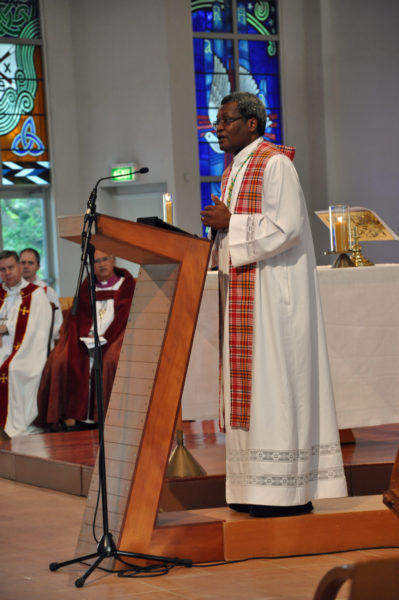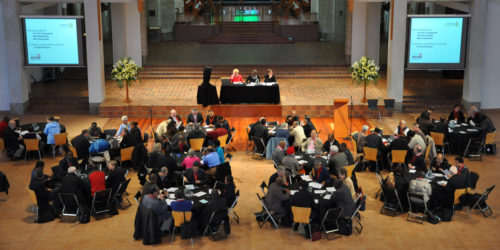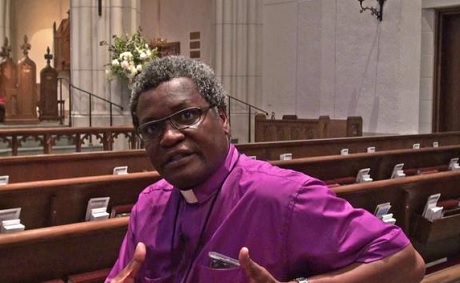Bishop Tengatenga on faith, controversy and the Anglican CommunionPosted Dec 10, 2014 |
|
[Episcopal News Service – Charleston, South Carolina] Former Southern Malawi Bishop James Tengatenga, who chairs the Anglican Consultative Council (ACC), says the Anglican Communion is still in the middle of painful struggles, but those struggles have made its members “think about who we are, what we are about, and not only think about it but actually talk about it and engage with it.”
“So, one hopes then that we are more intelligent about our faith and our being,” Tengatenga said during a recent interview with Episcopal News Service.
Tengatenga also spoke during the interview about the structure and importance of the ACC (the Communion’s main policy-making body), the possibility of an Anglican Congress and the influences on his religious life.
ENS spoke with Tengatenga during his visit to the Episcopal Church in South Carolina’s 224th annual convention. He was the preacher for the convention’s opening Eucharist.
Tengatenga was appointed in May as distinguished visiting professor of global Anglicanism at the University of the South’s School of Theology in Sewanee, Tennessee.
An edited transcript of the rest of the ENS interview follows.
As chair of the Anglican Consultative Council, what do you identify as the mission priorities for the Anglican Communion at this time?
The first one is just being present with people in their circumstances – given all the pain, hatred and war, and the natural calamities that have befallen the world at the moment –either simply by prayer or by coordinating relief work; being the presence of Christ in the world in that way.
Secondly, and it is strange to put it second because it undergirds everything, the actual proclamation of the Gospel in word by evangelizing; continuously standing for the Gospel for the people of God and also bringing people to Christ because that’s our job individually and as Communion.
And, obviously, reconciliation in the glaring, controversial decade we have been through and also simply reconciling with our own humanity [which] I hope also then becomes a witness [to] the world, with creation, with wealth disparity, ideological disparity. We’re talking about a globalization which should resonate with catholicity but it doesn’t. The current globalization is hegemonic of a particular ideological kind. So the mission now of the church, I believe, is reconciling that and turning people back to God, to being reconciled with themselves, reconciled with nature, reconciled with the economic order.
How have you enjoyed this role since you took the helm of the ACC in 2009? I imagine there have been both moments of joy and frustration.

Former Diocese of Southern Malawi Bishop James Tengatenga, chair of the Anglican Consultative Council, preaches Nov. 7, 2012 in the Auckland, New Zealand Holy Trinity Cathedral during the closing Eucharist of the ACC’s 15 meeting. Photo: Mary Frances Schjonberg/ENS
The church of God lives on in spite of our squabbles and misunderstandings and divisions. So the joy of being able to see the church catholic alive at work in the midst of all the confusion is priceless. And also I’ve now had two different archbishops [of Canterbury] with two different styles, each one so committed to lead the church and the people of God in the direction that will truly proclaim the Gospel … and continuing to build on that which we have received through Christ and through his church.
Of course, the pain is the continued declaration of cessation of relationships. I hear it – it hurts to hear that – and [I hear the] blames left, right and center about what causes that and where it’s going to be. I’ve yet to see the physicality of that because the theological reality of the body of Christ remains, albeit strained, but it is watching that strain that is painful and stressful because it eats on you when you see brother turning against brother and sister turning against sister, and beginning to demonize each other and forgetting the truth that we are saints.
Do you believe the Anglican Communion is in a healthier place than it was a decade ago?
Yes, because sometimes people confuse painlessness and health. I mean, I used to run once upon a time when I was young, and running in Texas heat in midday doing 10 kilometers just for the fun of it hurt, but it was fun and it was healthy. I think that’s where we are. We are in the middle of painful struggles, like I said, but it has made us think about who we are, what we are about, and not only think about it but actually talk about it and engage with it. So, one hopes then that we are more intelligent about our faith and our being.
Communion for those of us who have always been Anglican is something we’ve always taken for granted and that’s why it’s been difficult to define what holds us together. Paper doesn’t, law doesn’t, even sacraments don’t. It’s something beyond words that holds us together and that is Christ himself and his very spirit. So struggling to articulate that, which I hear all over the place, is for me a healthy sign.
And even for those who have chosen to leave, guess what they’re called? Anglican this, Anglican that. We are struggling to actually articulate what it is that we hold so dearly and can’t let go. So if I really don’t want this, I would quit and when I quit I wouldn’t want to be identified with it in any way, shape or form. So, why do you quit and want to continue to be identified with something?
It means there is something significant about the nature of the church and the struggle to find ourselves and our soul and where God is moving us to. If that is painful, I would want to think that it is painful in the kind of exercise pain [way] where you feel that healthiness of coming out of that struggle of self-identification and self-understanding in God. Whether someone will come and fully take [the] temperature and say ‘this is healthy,’ I always believe that’s God’s business, not human business. We can see signs, we can do something about them but it’s God’s business to actually declare the health of God’s people.
With centuries-old church structures being challenged and facing reform, do you think the Anglican Consultative Council, in its current make up, is the right model for the work it and the Communion have to do in the 21st century?

The Anglican Consultative Council last met Oct. 27-Nov. 7, 2012, mainly at Holy Trinity Cathedral in Auckland, New Zealand. The ACC includes bishops, clergy and lay people. One to three persons come from each of the Anglican Communion’s 38 provinces, depending on the numerical size of each province. Photo: Mary Frances Schjonberg/ENS
Currently, I would want to say yes and I don’t think it can be anything else from what it is now, in the sense of … we have a model. Now that we have that model, how do we perfect it and make it do what we intend for it to do in order to organize ourselves?
We can’t call ourselves ‘Communion’ and not have a physical reality of experiencing that. The only place we experience that – and I want to emphasize that – the only place currently where we experience that is the ACC. There is never any time when the Communion comes together in a visible form, physical representatives of each and every province, and each and every order, in the way that we organize ourselves [other than the ACC]. The question is how do we make it work better. How do we make it be that body that we have intended it to be?
I think for a long time the Communion in its life has lived as though [the ACC] didn’t exist. Not that it didn’t exist, but we lived as though it didn’t; it didn’t matter. I think that is why I am saying the church is in a healthier place now because it is actually looking at itself and the systems that it set in place to be able to fully minister and to fully reflect its catholicity and to fully reflect the Gospel in a way that is respectful of the uniqueness of each member individually, the uniqueness of each member in orders, uniqueness of each province – each church – because we are a communion of churches. It is this that facilitates that uniqueness and yet that unity at the same time.
Certainly, I am not saying that it is perfect, not only because I think perfection is for the future and is that which we work at every day, but because I think it’s a living organism. And was there ever a time when the church was continuously the same? No. From Jesus’ time we’ve been in transformation . . . morphing into what we have become.
I’m not sure we can do much better than where we are now. It would take a few decades to get anywhere because we work in triennials and sometimes in other places biennials in the different provinces. So, even if we were to say overnight we want to change this, it would take a minimum of six years even to define what it is that we want before we can begin to ask [if] we have defined it, now do we accept it. Then another six years before we can accept it.
A group of bishops from around the Anglican Communion recently met in New York and their communiqué asked whether it was time for another Anglican Congress. What is your reaction to that idea?
It’s always been time for another congress. The first one was in 1908 and as a Communion we intended not only to have another one, we intended to celebrate a century of that with the Lambeth [Conference] 2008, but the finances were wanting in that process. It failed us.
I was part of the planning of the last Lambeth Conference and our initial charge was to plan a congress – a gathering – alongside Lambeth Conference, which was almost an exact mirror of 1908.
Then, of course the next [Anglican Congress after the 1908 gathering] happened in ’54 in Minneapolis and the last one in Toronto [in 1963] and the idea was, that given the Toronto timing which was five years before the next Lambeth Conference, to be a possible pattern in which we could do congresses every five years.
Interestingly enough, I was dealing with this in my class earlier this week and talking about jamborees. I know there is a cynical view of jamboree but if you ask anyone who has been to a jamboree, given that the language that comes from the Boy Scout movement, which incidentally began in 1908, it has transformed their outlook not only of the Scouting movement but of their own personal being. That is what this is about.

“Communion for those of us who have always been Anglican is something we’ve always taken for granted and that’s why it’s been difficult to define what holds us together,”says Bishop James Tengatenga, who chairs the Anglican Consultative Council.
Photo: Diocese of Texas
[Anglican Congresses] are seminal in the sense that we think afresh, unencumbered admin[istration]. Admin is important and I don’t think, like some people have been saying, simply maybe we should replace the Lambeth Conference and just have congress instead. I think that’s a fallacy, really. You can’t do that; you will create another Lambeth-type thing because you can’t have an organization and not have leaders meeting and doing admin. [But there isn’t time there in those type of meetings] to get down to the roots of what we believe and what we may be looking at in a seminal way that congresses have done.
[Congresses] have marked our life . . . 1963 made us reflect on what does it mean to engage in mission in a multinational, multicultural body and in an unequal society where some have and some don’t. And is it true that some have and some don’t? Or is it the question that some have something else and others have something else, and together we are therefore mutually responsible to one another and mutually interdependent? [The 1963 Anglican Congress] gave us the language of mutual responsibility and mutual interdependence …
We became attentive and attuned to the fact that we are partnered with one another, but had never quite defined what that was, and how long it can be and what form it takes, and the givers and takers, and so forth. And we [had] never figured out what it was to be in mission so those that were involved in mission simply went to places to do what they thought was important to them. We can almost say that what we are working through is what we said in ‘Mutual Responsibility and Interdependence.’ And mutuality continues to be questioned; responsibility to one another [continues to be questioned].
So these [congresses] are seminal to the way we look at ourselves and engage in God’s work. I don’t think there will ever be a time when we don’t need one. I think the question is can we be responsible enough as Communion to figure out to organize one, foot the bill and make it work, and not turn it into showmanship.
You were at the center of a controversy last year when your appointment at Dartmouth College was withdrawn over comments you had made about homosexuality. What did you learn from that experience or are you still learning from it?
I don’t think there will be a time that I exhaust the learning from that experience; it’s fraught with all kinds of things. It was a painful experience.
Basically you find that people are still suspicious of the ‘different,’ whatever the different is, and, on the basis of that, make judgment calls that don’t hold substance, but unfortunately if you are so inclined as to believe yourself rather than the truth that’s facing you then you end up doing stuff.
And also learning to appreciate the love of God’s people because the response I got in my support after that experience, I cannot even begin to tell.
And also then obviously learning to be in the wilderness because at that point then, what next?
And then Sewanee came next. What is your focus at Sewanee?
Teaching mission studies – missiology – and teaching it, looking at it from my perspective, from the world I live in as a recipient – a product of – mission, and an agent of mission … It’s basically like, well, here’s time to share my story with Jesus and his work and what it has been, but in an academic sense and shaping people for ministry. And also talking about global Anglicanism.
It is a privilege, really, to be able to share my lived experience of the catholicity of the church and the way the councils of the church work. All of us imagine we know, but what we know is only what we have experienced or heard within the context of the controversy today, but to think that the Communion is bigger than that and is older than that. We may not have articulated it the same way, but we have seen it unfold before our eyes from way back when.
[I also ask about] how is that Anglicanism today an expression of God in the world, in the participation in God in the world, an expression of but one experience of the people of God in his catholic church. Being able to talk about that and also discovering with the students the humility of an Anglican stance, which is, from day one, Anglicanism never considered itself to be the full and sum total of the church catholic. It has always seen itself as but one expression of the church catholic and making us so disposed, therefore, towards the unity of the people of God and working towards it.
– The Rev. Mary Frances Schjonberg is an editor/reporter for the Episcopal News Service.

Social Menu